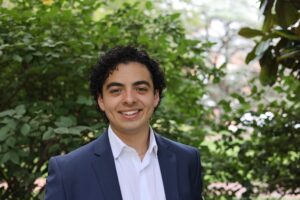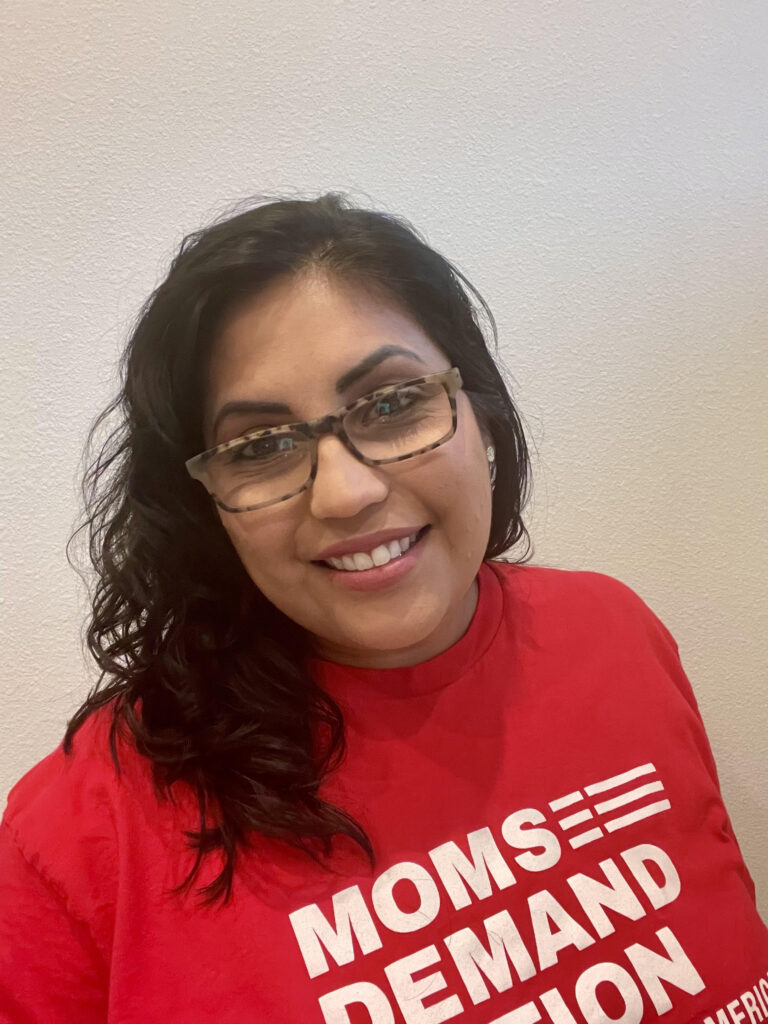10.11.24 • Featured
How These Two Latinx Demand a Seat Participants “Got Off the Sidelines” and Made Tangible Change
The U.S. marks Latinx Heritage Month every year from September 15 through October 15.
What is Latinx Heritage Month, and why does it start in the middle of September?
Latinx Heritage Month is an opportunity to celebrate the achievements, contributions, and history of the Latinx community. It starts on September 15 because this date commemorates the anniversary of independence for several Latin American countries, including:
- Costa Rica,
- El Salvador,
- Guatemala,
- Honduras, and
- Nicaragua.
During Latinx Heritage Month, Everytown also recognizes the specific impacts of gun violence on Latinx individuals and communities. For too many years, Latinx communities have borne some of the heaviest burdens of gun violence, dying from gun violence every day and at rates disproportionate to their white peers. Systemic inequities across institutions and generations of racial discrimination have exacerbated this crisis for communities of color, including Latinx communities. Whether it be through hate-motivated violence, city gun violence, police violence, or firearm suicide, Latinx communities remain among the most severely threatened groups.
We know that gun violence survivors and prevention advocates are some of the best people to run for office and address those priorities. That’s why Everytown for Gun Safety Victory Fund leverages its Demand a Seat educational training program to equip volunteers to run for office and support campaigns to be part of making change at the local, state, and federal levels.
We asked two Latinx Demand a Seat participants about their experiences in the program, how they are marking Latinx Heritage Month, and how their identities impact their work for gun violence prevention.
Answers have been lightly edited for length and clarity.
Note: Although Everytown uses the term Latinx, we know that communities and individuals are not a monolith. Many prefer to identify with other terms, including Latino, Latina, Latine, or Hispanic; the answers below reflect this.
What does being Latinx mean to you?
Jaime Martinez (he/him): My family comes from Nicaragua, and being Latino means being radically inclusive, hardworking, honest, and FUN.

My parents are examples of what it means to fulfill the well-fought American Dream. Their legacy is enveloped in who I am and what I do for the world.
The Latin community is comprised of so many different communities: the label itself sets a tone for us to be radically inclusive. We also know how to throw the best parties, and we manage to bring whimsy and fun into all the spaces we enter!
Ashley Cisneros Mejia: I am very proud to be an American of Mexican descent.

My father’s family came to Texas in 1850, and my mother’s family came in the early 1900s.
My culture impacts every part of me: My dedication to my family, my faith, my patriotism, how I see the world, how the world sees me, my fire for justice and equity, and my empathy for others.
How, if at all, do you mark Latinx Heritage Month?
Jaime Martinez: I enjoy going to festivals, being around friends and family, and continuing to be an example of Latinidad for those around me.
In reality, though, our celebration can’t be confined to a month, and I celebrate it 365 days a year!
Ashley Cisneros Mejia: I celebrate all month long, especially with eating delicious cuisine, watching Latine-made documentaries, and reading books to my kids. And I listen to lots of Latin music!
What do you wish more people knew or understood about Latinx communities?
Jaime Martinez: We are not a monolith! We are complex! I make a point of being open and supportive of conversations around Latinidad with the people around me to help educate others on the challenges faced by communities like mine.
Ashley Cisneros Mejia: I wish more people understood that the Latine community is not a monolith. We all have very different experiences, and there’s no one way to talk or connect with us.
How, if at all, does being Latinx inform how you engage in the gun violence prevention space?
Jaime Martinez: Our community suffers from gun violence, like many others in the U.S. Understanding our cultural grieving process, while bringing the big-tent, inclusive mindset into my organizing, informs how I engage in the gun violence prevention space.
Ashley Cisneros Mejia: As a Mexican-American with deep roots in the South, my culture profoundly shapes the way I engage in the gun violence prevention space.
Many of the people I love are responsible gun owners. In my family, protecting Second Amendment rights has been an integral part of our traditions and belief system about what it means to be self-reliant. My community has often owned firearms as a means to protect our property and family safety—especially as people of color in regions that are particularly impacted by racism.
I approach the conversation around gun violence prevention with an understanding of the nuances that come along with firearms. My cultural perspectives allow me to engage with respect and openness. My Latine identity has ingrained in me that there are many different viewpoints on firearms, that those viewpoints are valid, and that they are deeply rooted in people’s lived experiences.
How did you first hear about Demand a Seat, and why did you decide to join the program?
Jaime Martinez: I’ve always had a deep respect for Moms Demand Action and Everytown. I first became politically aware through the efforts of gun violence prevention activists following the shooting at Marjory Stoneman Douglas High School in Parkland, Florida.
Melinda Wedde, a local activist and community organizer, told me about the Demand a Seat program. The opportunities it offered to meet like-minded individuals and learn from experts made the decision to participate a no-brainer.
Ashley Cisneros Mejia: I heard about the Demand a Seat program through the Florida chapter of Moms Demand Action. Our chapter also had a wonderful visit from an Everytown staff member, who shared information about Demand a Seat with the Moms Demand Action chapter members.
I applied to the Demand a Seat program while I was volunteering as a Communication Director for a Gun Sense Candidate who was running for state representative. That was the first campaign I ever volunteered on. I applied to the program because I thought Demand a Seat would be the perfect opportunity to help me learn effective strategies to support a campaign.
“My candidate ended up winning his election and flipping his House seat here in Florida. I was proud to be part of his team, and I am thankful to Demand a Seat for helping along the way!”
—Ashley Cisneros Mejia, Demand a Seat participant and campaign volunteer
What was your experience like with Demand a Seat?
Jaime Martinez: What stood out to me above all were the people I met from across the country. These are folks who don’t fit the stereotype of a candidate or campaign manager but that felt called—by way of tragedy or inspiration—to do the hard things required to right the wrongs that our legislators have neglected for far too long.
I met mothers who suffered immeasurable heartbreak. They carry themselves with an indomitable strength and resolve to ensure no other mother suffers through what they have faced.
Ashley Cisneros Mejia: I really loved my experience with Demand a Seat. I especially enjoyed the sessions featuring elected officials who successfully won their campaigns. It was inspirational to hear their real-life stories and see examples of how the topics we were learning could be applied in actual campaigns. The program breakout sessions where we practiced communicating our messages were especially helpful.
“I learned that winning and governing requires authentic, raw, and grounded storytelling.”
—Jaime Martinez, Demand a Seat participant
How have you implemented the learnings from Demand a Seat in your daily life? How, if at all, did it equip you to take the next step in your advocacy?
Jaime Martinez: I now work as a Regional Political Director for the Pennsylvania Democratic Party Coordinated Campaign. Many of the lessons learned and terminology taught during Demand a Seat are directly applicable to my current role.
The Demand a Seat learnings have allowed me to hit the ground running and fluently work to bring people together to elect gun safety advocates up and down the ballot.
Ashley Cisneros Mejia: The program was meaningful and immediately impactful for me. I could take the best practices and advice we received in training and immediately put those concepts into action on the local campaign with which I was volunteering.
My candidate ended up winning his election and flipping his House seat here in Florida. I was proud to be part of his team, and I am thankful to Demand a Seat for helping along the way!
What would your younger self be most proud of if they saw you now?
Jaime Martinez: Younger Jaime would be excited and proud to know that 2024 Jaime is engaging in fulfilling and meaningful work.
I’ve always wanted to be able to get up every morning and know exactly why I do the things I do—a chance to believe in my job. It’s a blessing and a privilege to say that about what I do now.
Ashley Cisneros Mejia: My younger self would be proud to know that I got off the sidelines and channeled my frustration about gun violence into tangible change.
Do Something
There’s no one way to get involved in the gun violence prevention movement—but you can do something to make a change.
- Learn more about Latinx Heritage Month.
- Learn more about the Demand a Seat program.
- Join your local Moms Demand Action or Students Demand Action group.